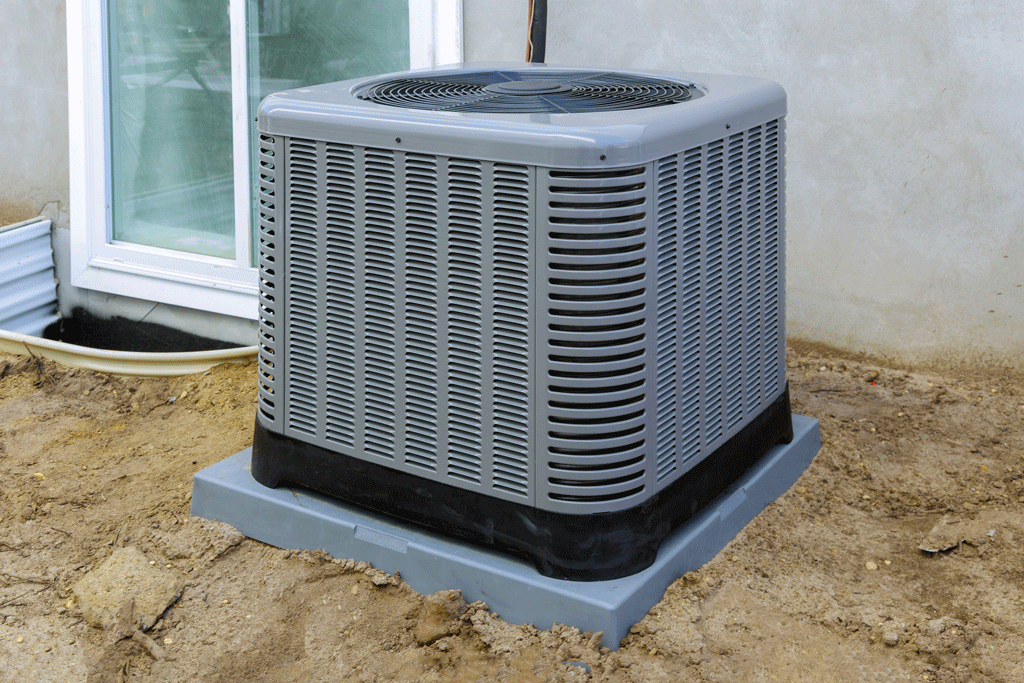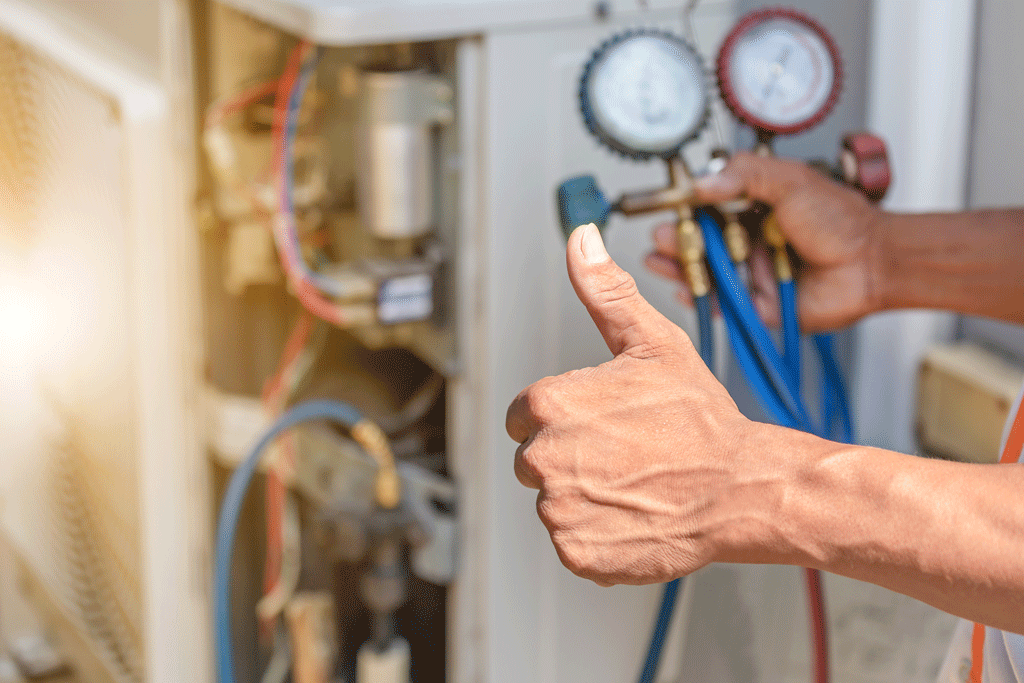Air Conditioning Repair: The Ultimate Guide to Keeping Cool

Have you ever found yourself sweating on a hot day because your air conditioner decided to take a break?
As a homeowner, you understand the importance of a functioning air conditioner. But what happens when it breaks down?
In this article, we’ll dive deep into the world of air conditioning repair. From understanding the basics to finding the best professionals in your area, we’ve got you covered.
What is Air Conditioning Repair?
Air conditioning repair is an essential service that ensures your cooling system operates efficiently, especially during those sweltering summer months. But what exactly does it entail?
At its core, air conditioning repair refers to the systematic process of diagnosing issues within the air conditioning system and subsequently rectifying them.
This can range from simple tasks to more complex procedures, and here’s a breakdown:
1.Diagnosis
Before any repair begins, a thorough examination of the air conditioner is conducted. This helps in pinpointing the exact problem, be it electrical, mechanical, or related to the refrigerant.
2.Filter Replacement
One of the most common and straightforward repairs is changing the air filter.
A clogged or dirty filter can reduce airflow, making the system work harder and, in turn, increasing energy consumption. Regularly replacing the filter ensures the air you breathe is clean and your AC runs efficiently.
3.Refrigerant Issues
If your AC isn’t cooling as it should, it might be due to a refrigerant leak or low refrigerant levels.
Addressing this requires expertise, as the refrigerant needs to be handled with care and the system should be refilled to the manufacturer’s specifications.
4.Component Repairs or Replacement
Over time, parts like the compressor, fan blades, or electrical components might wear out or get damaged. Depending on the diagnosis, these might need repair or complete replacement.
5.Systematic Cleaning
Dust and debris can accumulate in various parts of the AC, such as the evaporator coils or the vents. Regular cleaning ensures optimal performance and extends the lifespan of the unit.
6.Thermostat Issues
Sometimes, the problem isn’t with the AC unit itself but with the thermostat. Ensuring it’s calibrated correctly and functions as it should is crucial for the overall operation of the system.
Understanding the intricacies of air conditioning repair is beneficial for every homeowner.
Not only does it empower you with knowledge when dealing with technicians, but it also helps in identifying issues early on, potentially saving you time, money, and the discomfort of a malfunctioning AC.
Moreover, with the rise of smart homes and integrated systems, the realm of air conditioning repair is evolving. Modern systems come equipped with diagnostic tools that can communicate issues in real-time, making the process of repair more streamlined and efficient.
While the basics of air conditioning repair might seem straightforward, the field is vast and continuously evolving.
Whether you’re dealing with a minor filter change or grappling with a major component replacement, having a grasp of the basics ensures you’re never left sweating on a hot day.
Common Issues and Their Solutions in Air Conditioning Repair
Air conditioning systems, like any other mechanical devices, are prone to a range of issues over their lifespan. While some problems are minor and can be addressed with basic maintenance, others might require professional air conditioning repair.
Here’s a detailed look at some of the most common issues and their solutions:
1.Refrigerant Leaks
One of the most prevalent problems in air conditioning systems is refrigerant leaks.
The refrigerant is the substance that your air conditioner uses to remove heat and humidity from the air in your home.
If the system develops leaks in the refrigerant lines, you won’t have enough refrigerant to cool the air effectively. It’s not just about refilling the refrigerant; it’s crucial to locate the leaks and fix them.
This task requires specialized equipment and expertise, making it essential to call in professionals for air conditioning repair. Once the leaks are fixed, the technician will refill the refrigerant to its optimal level, ensuring efficient cooling.
2.Sensor Problems
Modern air conditioners come equipped with a thermostat sensor, located behind the control panel. This sensor measures the temperature of the air coming into the evaporator coil.
If the sensor gets knocked out of its proper position, the air conditioner might cycle continuously or behave erratically. Adjusting the sensor to its correct position, so it’s near but not touching the coil, can resolve this issue.
Regular checks and maintenance can prevent such sensor-related problems.
3.Drainage Issues
Just like a refrigerator, air conditioners produce a significant amount of condensation. This water needs to be drained out of the system to prevent issues.
Especially in humid weather, the condensate drain can become clogged due to algae or mold, causing water to back up. This can lead to not only reduced efficiency but also potential water damage in your home.
Regularly checking and cleaning the drain can prevent such issues.
4.Electric Control Failures
The compressor and fan controls in an air conditioner can wear out over time, especially if the system turns on and off frequently. This frequent on-and-off cycle can be caused by an oversized system.
Corrosion of wires and terminals is also a problem in many systems. Electrical connections and contacts should be checked during a professional service call to ensure efficient operation.
5.Dirty Filters
Perhaps the simplest yet most overlooked issue is dirty or clogged filters.
A clogged filter restricts airflow, reducing the system’s efficiency and ability to effectively cool the air. This can also put strain on the system, leading to premature wear and tear. Regularly changing filters is a simple maintenance task that homeowners can perform, ensuring the air conditioner runs efficiently and prolongs its lifespan.
understanding these common issues and their solutions can help homeowners identify when they need professional air conditioning repair.
Regular maintenance and timely interventions can ensure that the system runs efficiently, providing cool and comfortable air throughout its lifespan.
Photo By Maks_lab at Shutterstock
DIY vs. Professional Repairs in Air Conditioning Repair
In the age of DIY tutorials and how-to videos, many homeowners are tempted to take matters into their own hands when it comes to air conditioning repair.
While this can be a cost-effective approach for minor issues, it’s crucial to understand the distinction between tasks suitable for DIY and those that require professional intervention.
Understanding the Basics
Before diving into any repair, whether DIY or professional, understanding the basics of how an air conditioner works is essential.
Familiarizing yourself with the main components, such as the compressor, condenser, evaporator, and expansion valve, can give you a clearer picture of what might be going wrong.
DIY Repairs
Filter Replacement: One of the most straightforward tasks, changing the air filter, can significantly improve the efficiency of your system. A clogged filter can restrict airflow, making the system work harder and consume more energy.
Cleaning: Regularly cleaning the external unit, ensuring there’s no debris, leaves, or dirt obstructing the vents, can enhance the system’s performance.
Thermostat Check: If your AC isn’t cooling effectively, sometimes the issue might be as simple as the thermostat being set to the wrong temperature or mode.
Circuit Breaker Check: If your AC isn’t turning on, checking the circuit breaker to ensure it hasn’t tripped is a good first step.
When to Call the Professionals
Refrigerant Leaks: While you might identify that your AC is low on refrigerant, handling, and refilling refrigerant is a task for professionals. They have the necessary equipment and expertise to fix leaks and refill the system safely.
Electrical Issues: Any problems related to the electrical components of the AC, be it faulty wiring, malfunctioning controls, or burnt-out capacitors, require professional intervention. Tinkering with these can be dangerous and lead to more significant issues.
Major Component Failures: If there’s a problem with primary components like the compressor or the condenser, it’s best to call in the experts. These repairs can be complex and require specialized tools.
Regular Maintenance: Even if there’s no apparent issue, having a professional check and service your AC annually can prevent potential problems and ensure the system runs efficiently.
The Risks of DIY: While DIY repairs can save money upfront, a wrong move can lead to more significant problems and expenses in the long run.
For instance, incorrectly handling refrigerant can harm the environment and pose health risks. Similarly, mishandling electrical components can lead to short circuits or even fires.
While the DIY approach has its merits, knowing when to call in professionals for air conditioning repair is crucial. It’s always better to be safe than sorry, ensuring your AC serves you
Maintenance Tips for Air Conditioning Repair and Prevention
Maintaining your air conditioning system is akin to taking your car for regular oil changes.
While it might seem like an additional task on your to-do list, regular maintenance can prevent a multitude of common issues, ensuring your system runs efficiently and prolongs its lifespan.
Here are some essential maintenance tips to keep your air conditioner in top shape:
Filter Replacement
The air filter is the first line of defense against dust, pollen, and other airborne particles.
Over time, these filters can become clogged, restricting airflow and reducing the system’s efficiency. For optimal performance, it’s recommended to check and replace your filters every 1-3 months, depending on usage and air quality in your area.
Not only does this improve air quality in your home, but it also prevents the system from overworking, which can lead to more significant air conditioning repair needs.
Regular Cleaning
External Unit: The external unit or the condenser is exposed to the elements. Over time, it can accumulate leaves, dirt, and other debris. Ensure the area around the unit is clear, and give it a gentle clean with a soft brush or hose to maintain optimal airflow.
Evaporator Coils: These coils can collect dirt over months and years of service. A dirty coil will reduce the system’s ability to cool your home. Check and clean the coils annually to ensure efficient operation.
Drain Channels: Clogged drain channels can prevent the system from reducing humidity, leading to excess moisture and potential water damage. Regularly check the channel and clear any blockages with a stiff wire.
Thermostat Checks
Regularly check your thermostat to ensure it’s working correctly.
With the advent of programmable thermostats, you can set your AC to cool your home just before you return, saving energy and money. If you’re still using an old mechanical thermostat, consider upgrading to a digital one for more accurate temperature settings.
Seal and Insulate
Ensure that your home is adequately sealed and insulated. This prevents the cool air from escaping, reducing the workload on your AC.
Check for any leaks around windows and doors and seal them. Proper insulation in your attic can also prevent heat from entering your living spaces.
Professional Check-ups
While DIY maintenance can go a long way, it’s essential to have a professional AC repair and maintenance service check your system annually.
They can spot potential issues before they become significant problems, ensuring your AC runs efficiently throughout the hot months.
Stay Updated
Technology and best practices evolve.
Stay updated with the latest maintenance tips and techniques. Sometimes, a small change in your routine can lead to significant energy and cost savings.
A little effort in maintaining your air conditioner can save you from hefty air conditioning repair bills in the future. Regular checks, cleaning, and professional oversight can ensure your system provides cool comfort for years to come.
Photo By Billion Photos at Shutterstock
Cost Implications of Air Conditioning Repair
When your air conditioner starts showing signs of wear or malfunction, one of the primary concerns that come to mind is the cost.
How much will it set you back?
Is it worth repairing, or should you consider replacing the entire unit? Understanding the cost implications of air conditioning repair can help you make informed decisions and ensure you get the best value for your money.
1.Factors Influencing Repair Costs:
Nature of the Issue: Minor issues like a clogged filter or a malfunctioning thermostat will naturally cost less to fix compared to significant problems like a faulty compressor or refrigerant leaks.
Age of the Unit: Older units might have parts that are harder to find or are obsolete, potentially driving up repair costs.
Geographical Location: AC repair costs can vary based on where you live. Urban areas or regions with a higher cost of living might have higher service charges.
Time of Service: Emergency repairs or services outside of regular business hours can attract premium charges.
2.Getting Multiple Quotes
It’s always a prudent idea to get quotes from multiple service providers.
This not only gives you a ballpark figure of the expected costs but also allows you to compare services. Some providers might offer additional services like maintenance checks or warranties that add value to their offering.
3.Reading Reviews
While cost is a significant factor, the quality of service is equally crucial.
Online platforms and forums can provide reviews and testimonials from previous customers. These reviews can give insights into the professionalism, quality of work, and reliability of the service provider.
4.Preventive Measures and Long-Term Savings
Investing in regular maintenance can prevent many common issues, potentially saving you from hefty repair bills in the long run.
For instance, a well-maintained air conditioner runs more efficiently, reducing energy bills. Over time, these savings can offset the costs of maintenance.
5.Replacement vs. Repair
Sometimes, the cost of repairing an old, inefficient unit might approach or even exceed the cost of installing a new one.
In such cases, it’s worth considering the long-term benefits of replacement. A new unit will likely be more energy-efficient, come with a warranty, and reduce the frequency of repairs.
6.Financing and Discounts
Some air conditioning repair service providers offer financing options or discounts, especially for significant repairs.
It’s worth inquiring about any available offers, especially if faced with unexpected repair costs.
While the immediate cost of air conditioning repair is a valid concern, it’s essential to consider the bigger picture. By understanding the factors that influence repair costs, seeking multiple quotes, and prioritizing quality service, you can ensure your air conditioner serves you efficiently without breaking the bank.
The Evolution of Air Conditioning Repair
Air conditioning has come a long way since its inception. With advancements in technology, the methods and approaches to AC repair have evolved significantly. Let’s journey through the past, present, and future of AC repair.
The Early Days of Air Conditioning
The concept of air conditioning dates back to ancient civilizations. While the primary goal was to keep cool, the methods were vastly different from today’s sophisticated systems.
- Ancient Egypt: The Egyptians used reeds hung in windows, with water trickling down. As the water evaporated, it cooled the incoming air.
- Ancient Rome: Aqueduct water was circulated through walls to cool rooms.
- Medieval Persia: Windcatchers and qanats were used to cool buildings.
While these methods were innovative for their time, they were far from the efficient systems we have today. The need for air conditioning repair in these times was based on maintaining these rudimentary systems.
The Birth of Modern Air Conditioning
The late 19th and early 20th centuries saw the birth of mechanical air conditioning. Willis Carrier’s invention in 1902 marked the beginning of modern air conditioning.
Refrigerants: Early systems used toxic gasses like ammonia. The shift to safer refrigerants marked a significant advancement in the safety and efficiency of AC units.
Centralized Systems: The introduction of centralized air conditioning systems brought about new challenges and repair needs. The complexity of these systems required specialized knowledge for air conditioning repair.
Technological Advancements and Repair Methods
With the digital age came advancements in air conditioning technology. Smart thermostats, energy-efficient models, and advanced sensors became the norm.
Diagnostics: Modern AC units come equipped with diagnostic tools that can pinpoint issues, making AC repair more efficient.
Remote Monitoring: Some advanced systems allow for remote monitoring, enabling professionals to assess and address issues without physical inspections.
Eco-friendly Systems: The push for greener solutions has led to the development of eco-friendly refrigerants and energy-efficient systems, changing the landscape of air conditioning repair.
The Future of Air Conditioning Repair
As we look to the future, the realm of air conditioning repair is set to undergo further evolution.
AI and Machine Learning: Predictive maintenance, powered by AI, can foresee potential issues, allowing for proactive air conditioning repair.
Augmented Reality (AR): AR can assist technicians in real-time, guiding them through complex repair processes.
Sustainability: As the world moves towards sustainable solutions, the repair industry will need to adapt, focusing on maintaining and repairing eco-friendly systems.
Understanding the evolution of air conditioning and its repair methods provides a holistic view of its importance.
As technology continues to advance, the methods and approaches to AC repair will undoubtedly continue to evolve, ensuring our comfort and well-being.
Photo By mayu85 at Shutterstock
Top 5 Troubleshooting Steps Tips to Follow Before Calling an Air Conditioning Repair Specialist
Air conditioning systems are intricate machines, and like all machines, they can sometimes malfunction.
However, before you rush to call a professional for air conditioning repair, there are a few troubleshooting steps you can take.
Here are the top 5 tips to guide you:
1.Your unit won’t power on
It’s a sweltering day, and you realize your AC unit isn’t turning on. Before you panic, there are a few things you can check. Start with the basics:
Thermostat Batteries: Often, the simplest issues are the culprits. Your thermostat batteries might be drained. Try replacing them and see if the unit powers on.
Circuit Breaker: Electrical surges or other issues might trip the circuit breaker connected to your AC. Check your electrical panel and ensure the breaker is in the ‘on’ position.
Thermostat Settings: Ensure your thermostat is set to the ‘cool’ mode. Test its functionality by setting the temperature a few degrees below the current room temperature. If the AC kicks in, you’ve found your issue.
2.Your unit is not blowing cool air
An AC unit that’s running but not cooling can be frustrating. Here’s what you can check:
Air Filter: A clogged or dirty air filter can significantly reduce airflow, making your system work harder and inefficiently. Regularly changing your air filter ensures efficient cooling and can prevent this common issue.
Refrigerant Levels: Low refrigerant levels can also cause inadequate cooling. However, handling refrigerant requires expertise, so it’s best left to professionals.
3.Your AC unit is louder than normal
Unusual noises can be alarming. Here’s what they might indicate:
Internal Motor Problems: Banging, clanking, or screeching noises might suggest issues with the internal motor or other moving parts.
Refrigerant Leak: A hissing sound can often indicate a refrigerant leak, which can be harmful to the environment and reduce your AC’s efficiency.
4.Your energy bill is too high
If you’ve noticed a sudden spike in your energy bill, your AC might be the culprit. Here’s what you can do:
Regular Cleaning: Dust and debris can accumulate in various parts of the AC, reducing its efficiency. Regular cleaning can prevent such issues.
Check for Obstructions: Ensure that all vents and airways are clear of obstructions. Blocked vents can make the system work harder.
5.Troubleshooting doesn’t help
Sometimes, despite your best efforts, the issues persist. In such cases:
Call the Experts: Professionals in air conditioning repair can diagnose intricate problems, recommend solutions, and ensure your AC is back to optimal performance.
While these tips can help address common issues, it’s essential to recognize when professional AC repair is needed.
Regular maintenance and timely interventions can ensure your AC provides cool comfort throughout its lifespan.
The Health Benefits of Timely Air Conditioning Repair
While we often associate AC repair with comfort and temperature control, there’s another crucial aspect to consider: our health.
A well-maintained air conditioning system can have several positive impacts on our well-being, especially in regions with extreme weather conditions.
1.Improved Air Quality
Air conditioning systems do more than just cool the air; they also filter it. Over time, filters can become clogged with dust, pollen, and other pollutants.
Breathe Easier: Regular air conditioning repair ensures that these filters are cleaned or replaced as needed, leading to cleaner air circulation. This is especially beneficial for those with respiratory conditions or allergies.
Prevention of Mold Growth: In humid areas, AC units help reduce moisture levels in the air, preventing mold growth. Mold spores can be harmful when inhaled, leading to various health issues.
2.Better Sleep Quality
Temperature plays a significant role in our sleep quality. An overly warm or cold room can disrupt our sleep patterns, leading to fatigue and other health issues.
Optimal Sleep Temperature: A well-functioning AC unit can maintain the optimal temperature for sleep. Regular air conditioning repair ensures that the system can regulate temperatures effectively, leading to better sleep and overall well-being.
Humidity Control: Apart from temperature, AC units also control humidity levels, providing a more comfortable sleep environment.
3.Prevention of Heat-Related Illnesses
In extremely hot conditions, especially during heatwaves, air conditioning can be a lifesaver.
Prolonged exposure to high temperatures can lead to heat exhaustion, heatstroke, and other heat-related illnesses.
Stay Cool and Safe: By ensuring timely air conditioning repair, you can be confident that your AC unit will function optimally during these critical periods, providing a safe haven from the extreme heat.
Hydration and Comfort: A functional AC unit reduces excessive sweating, helping maintain hydration levels.
4.Mental Well-being and Productivity
Our environment plays a significant role in our mental well-being and productivity. A comfortable indoor temperature can boost mood and enhance focus.
Stress Reduction: A malfunctioning AC unit, especially during extreme weather, can be a source of stress. Regular maintenance and repair can alleviate this concern.
Enhanced Productivity: Studies have shown that people work better in comfortable environments. Whether you’re working from home or just relaxing, a well-maintained AC unit can enhance your experience.
While the primary function of air conditioning repair is to ensure our comfort, its impact on our health is undeniable.
From ensuring clean air to providing a safe environment during heatwaves, a well-maintained AC unit is a valuable asset for both our physical and mental well-being.
The Environmental Impact of Air Conditioning Repair
The role of air conditioning repair isn’t just about ensuring our comfort; it’s also about safeguarding our environment.
As our reliance on air conditioning systems grows, understanding the environmental implications and how repair methods can mitigate these impacts becomes crucial.
1.Refrigerants and the Ozone Layer
One of the most significant environmental concerns associated with air conditioning systems is the use of refrigerants.
These substances, essential for the cooling process, have historically had detrimental effects on the ozone layer.
CFCs and HCFCs: Earlier, chlorofluorocarbons (CFCs) and hydrochlorofluorocarbons (HCFCs) were commonly used in AC systems.
However, their release, due to leaks or improper disposal, contributed to ozone layer depletion.
Transition to Safer Alternatives: Modern air conditioning repair practices emphasize the use of safer refrigerants.
Hydrofluorocarbons (HFCs), for instance, have a much lesser impact on the ozone layer. Repairing older systems often involves replacing harmful refrigerants with these safer alternatives.
2. Energy Consumption and Carbon Footprint
Air conditioners consume a significant amount of energy, especially in warmer climates.
This energy consumption has a direct impact on our carbon footprint.
Efficiency Matters: An improperly maintained or malfunctioning AC unit consumes more energy. Air conditioning repair ensures that systems run efficiently, reducing energy wastage.
Technological Advancements: Modern AC units are designed to be more energy-efficient.
Repairing and upgrading older systems can lead to substantial energy savings and a reduced carbon footprint.
3.Waste Management and Recycling
Old parts, filters, and entire units eventually reach the end of their life. How we dispose of these components is crucial for environmental sustainability.
Recycling Components: Many parts of an AC unit, including metals and certain plastics, can be recycled. Modern air conditioning repair practices emphasize recycling over disposal.
Safe Disposal of Refrigerants: As mentioned earlier, refrigerants can harm the environment if not disposed of correctly. Repair and maintenance services ensure that these substances are safely contained and disposed of, preventing environmental harm.
4.The Role of Consumers in Environmental Conservation
While professionals play a significant role, consumers too have a part in ensuring the environmental sustainability of their AC units.
Regular Maintenance: By ensuring regular check-ups and maintenance, consumers can ensure their units run efficiently, reducing energy consumption and the need for frequent air conditioning repair.
Making Informed Choices: Opting for energy-efficient models, using smart thermostats, and understanding the importance of proper disposal and recycling can make a significant difference.
Air conditioning repair is not just about comfort; it’s about responsibility. As we understand the environmental implications of our choices, both professionals and consumers can work together to ensure a cooler, yet greener future.
One Hour Air Conditioning & Heating of Phoenix, AZ: Your Trusted Air Conditioning Repair Partner
When the Arizona sun blazes in its full glory, a functional air conditioner isn’t just a luxury—it’s a necessity. And when that essential piece of equipment falters, you need a reliable air conditioning repair service to restore your home’s comfort.
Enter One Hour Air Conditioning & Heating of Phoenix, AZ, a name synonymous with trust, efficiency, and expertise in the Phoenix metropolitan area.
Why Choose One Hour Air Conditioning & Heating?
-
Expertise
With years of experience under their belt, the team at One Hour Air Conditioning & Heating has encountered and resolved a myriad of AC issues.
Their technicians are trained to handle everything from minor fixes to major overhauls, ensuring your system is up and running in no time.
-
Stellar Reviews
A quick glance at their reviews and ratings paints a picture of satisfied customers and successful service calls. Their commitment to excellence is evident in the positive feedback they consistently receive.
-
Prompt Service
As their name suggests, they prioritize timely service. Recognizing the urgency of air conditioning repair, especially in the scorching Phoenix heat, they strive to address and resolve issues promptly.
-
Serving a Wide Area
While based in Phoenix, One Hour Air Conditioning & Heating extends its services to neighboring areas, ensuring residents across the region have access to top-tier air conditioning repair.
Whether you’re in upscale Scottsdale, picturesque Paradise Valley, bustling Chandler, vibrant Mesa, or the lively city of Tempe, their team is ready to serve.
-
Transparent Pricing
Nobody likes hidden costs or unexpected bills. One Hour Air Conditioning & Heating prides itself on its transparent pricing model.
Before commencing any repair, they provide a clear estimate, ensuring you’re informed and comfortable with the projected costs.
-
Safety First
In these times, safety is paramount. The team adheres to all recommended safety protocols, ensuring both their staff and your family remain protected during service calls.
-
Stay Cool with One Call
The Arizona heat can be relentless, but with One Hour Air Conditioning & Heating of Phoenix, AZ, relief is just a phone call away. Whether it’s routine maintenance, emergency air conditioning repair, or a system upgrade, they’ve got you covered.
When it comes to air conditioning repair in the Phoenix area, few names stand out as prominently as One Hour Air Conditioning & Heating of Phoenix, AZ.
Their blend of expertise, customer-centric approach, and commitment to excellence makes them the go-to choice for many.
So, the next time the temperature rises and your AC falters, remember to call them at # 480-508-8881.
Your comfort is their priority.
Photo By JU.STOCKER at Shutterstock
Conclusion
The importance of a well-functioning air conditioner, especially in regions with sweltering summers, cannot be overstated.
It’s not just about comfort; it’s about creating a sanctuary where you can relax, work, and spend quality time with loved ones. Air conditioning repair plays a pivotal role in ensuring this comfort is uninterrupted.
The world of air conditioning repair might initially seem complex and overwhelming. However, as with many things in life, a little knowledge goes a long way.
By understanding the basics of how your AC unit functions, recognizing common issues, and knowing maintenance best practices, you can often prevent minor problems from escalating into major malfunctions.
While there are numerous guides, videos, and resources available for the DIY enthusiast, it’s essential to recognize one’s limits.
Some tasks, like cleaning or filter replacement, can be easily managed at home. However, more intricate issues, especially those involving electrical components or refrigerant handling, require professional expertise.
If and when you decide to call in the experts, it’s crucial to choose the right service provider. As highlighted earlier, factors like experience, reviews, pricing transparency, and service areas play a significant role.
Remember, the cheapest option isn’t always the best. Quality service might come at a premium but can save costs in the long run by ensuring the job is done right the first time.
The realm of air conditioning repair and technology is continually evolving.
Newer models come with advanced features, better energy efficiency, and improved durability. Staying updated with the latest trends and best practices can help you make informed decisions, whether it’s about repairs, maintenance, or potential upgrades.
The conclusion of this article is not the end of the conversation. Engaging with a community of homeowners, experts, and enthusiasts can provide a wealth of knowledge. Sharing experiences, asking questions, and learning from others can be invaluable.
While air conditioning repair might seem daunting at first, it doesn’t have to be. With the right knowledge, resources, and approach, you can ensure your home remains the cool sanctuary you desire.
And remember, you’re not alone in this journey. Whether you’re seeking advice, sharing experiences, or have specific queries about air conditioning repair, feel free to drop your questions below.
Together, we can navigate the challenges and ensure our homes remain comfortable havens.
FAQs
How often should I service my air conditioner?
Regular maintenance every 6-12 months is recommended to ensure optimal performance.
What are the signs my AC needs repair?
Unusual noises, reduced cooling efficiency, and increased energy bills are common signs.
How long do air conditioners typically last?
With proper maintenance, they can last 10-15 years.
Is it worth repairing an old air conditioner?
If repair costs are 50% of a new unit, consider replacement.
How can I increase the lifespan of my AC?
Regular maintenance, cleaning, and timely repairs can extend its life.
What’s the average cost of air conditioning repair?
It varies, but minor repairs can start from $100, while major ones can go up to $1000.
How do I choose a reliable repair service?
Check reviews, get referrals, and compare quotes.
Can I do minor repairs myself?
Yes, but always refer to the user manual and ensure safety.
Why is my AC leaking water?
It could be due to a clogged drain or frozen evaporator coils.
How often should I change the filters?
Every 1-3 months, depending on usage and air quality.
See our most recent blog on this topic here.
Check out our reviews here
Photo By ungvar at Shutterstock









